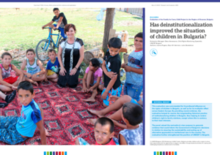Residential institutional care has long-term negative consequences for children’s physical, psychological and emotional well-being. Yet some parents are driven by economic, social and cultural pressures to place their children in institutions. In 2010, following national and international outcry over the poor conditions in children’s homes across the country, the Government of Bulgaria adopted the Vision for Deinstitutionalization of Children in Bulgaria. This five-year national strategy sought to end children’s institutionalization and move towards a more family-centric system of care.
To support the strategy and its action plan, UNICEF Bulgaria set up the Family for Every Child project in the Shumen region, in partnership with the national and regional governments. The project, which ran from 2010 to 2016, aimed to help strengthen the national child protection system to secure the best interests of the child in every case. More specifically, it aimed to develop a network of core services to support families, reduce the number of children entering institutional care and, ultimately, close the Home for Medical and Social Care for Children (HMSCC) in Shumen. A 2016 evaluation of the project concluded that much had been achieved – and establishing core support services such as family counselling centres (FCCs) had been key to this – but longer-term challenges remain.
The Family for Every Child project aimed to demonstrate that viable alternatives to institutionalization exist, and that as long as a network of suitable support services is in place, deinstitutionalization is achievable. UNICEF Bulgaria commissioned this evaluation to establish whether the project had been successful, looking beyond the main goal of closing the Shumen HMSCC.

